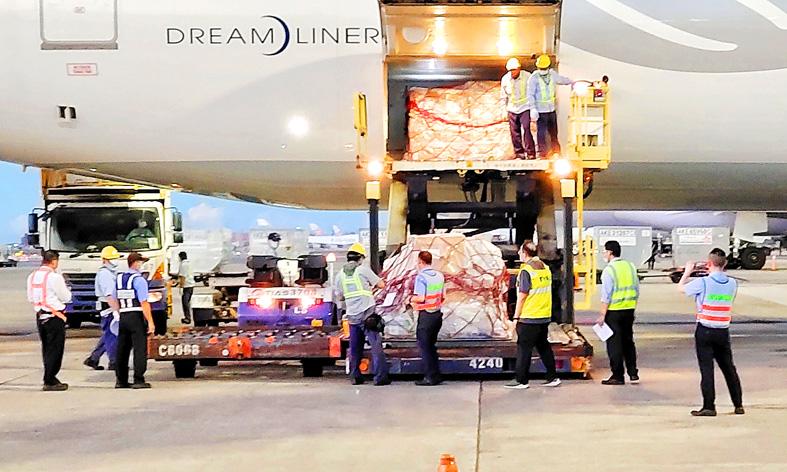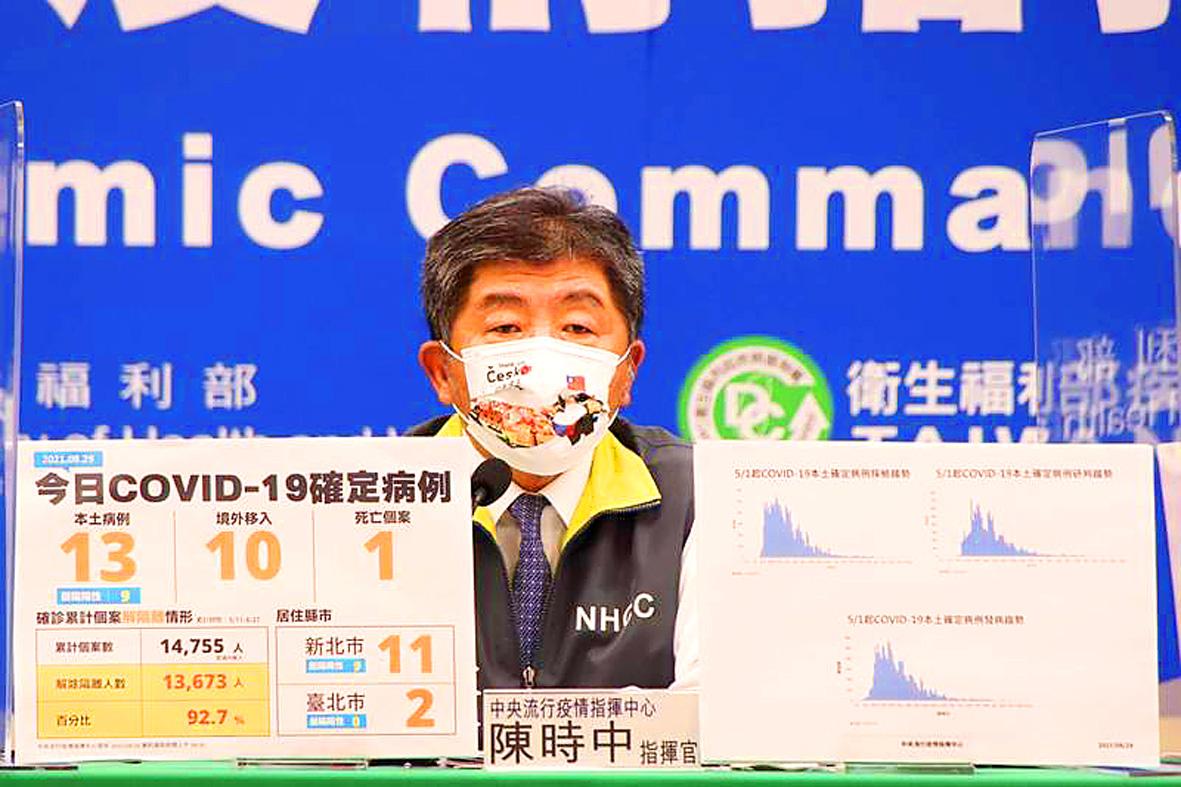The Central Epidemic Command Center (CECC) yesterday reported 13 locally transmitted infections, 10 imported COVID-19 cases and one death.
Minister of Health and Welfare Chen Shih-chung (陳時中), who heads the center, said that following two consecutive days of no local infections, 13 new cases were confirmed, including nine people who tested positive during isolation.
Eleven cases were reported in New Taipei City and two in Taipei, he said.

Photo: Tony Yao, Taipei Times
Ten of the cases in New Taipei City are family members who live in the same household in Sansia District (三峽), and the other is a worker at the Mega City (大遠百) shopping mall in Banciao District (板橋), Chen said, adding that expanded testing is being conducted among mall employees.
The infection sources of nine people in the family cluster have been found, while contact tracing continued to identify the infection sources of the remaining four cases, he added.
The first case in the family cluster is a man who had been hospitalized from the middle of June to early last month, Chen said.

Photo courtesy of Central Epidemic Command Center
The man tested negative at the time, but was tested again before a recent examination at a hospital. After the man tested positive, his family members were placed under isolation, he said.
Only one member of the family, a child, did not test positive for COVID-19, Chen said, adding that the infected family members are aged two to older than 50.
The one death that was confirmed yesterday was a cargo ship captain, whose case was reported last week, Chen said.
The 10 imported cases came from China, Cambodia, Myanmar, Pakistan, Vietnam and the US, he said.
Six of them had received their first dose of a COVID-19 vaccine, and the other four were fully vaccinated, said Centers for Disease Control (CDC) Deputy Director-General Philip Lo (羅一鈞), deputy head of the CECC’s medical response division.
Of the four, one had received three doses of the Chinese-made ZF2001 vaccine, an adjuvanted protein subunit vaccine; one had received two doses of the Chinese-made Sinovac (科興生物) vaccine; one had received US firm Johnson & Johnson’s single-dose Janssen vaccine; and one had received two doses of the Indian-made Covaxin vaccine.
Chen also provided an update about a breakthrough infection reported on Saturday — a pilot at a Taiwanese airline who had received two doses of the AstraZeneca COVID-19 vaccine.
Twenty-one close contacts of the pilot have tested negative, while two are awaiting test results and five are to be tested, Chen said.
The center suspects there might be loopholes in the implementation of the procedures to protect flight crews from COVID-19 infection during overseas flights, he said.
The procedures would be reviewed, Chen said, adding that quarantine rules for flight crew members would likely be tightened.
Meanwhile, a shipment of 30,000 Moderna COVID-19 vaccine doses donated by the Czech Republic arrived in Taiwan yesterday afternoon.
“We are very grateful for the donation... When many countries around the world are facing vaccine shortages, the Czech Republic is still willing to express its friendship, which is very helpful to the people of Taiwan,” Chen said.
Chen and the other CECC officials at the daily news briefing wore masks that bore the message “Thank you Cesko,” and the national flags of Taiwan and the Czech Republic.
In related news, more than 1.97 million people had added the Pfizer-BioNTech COVID-19 vaccine to their preferred vaccine brands three hours after registration opened on the national online COVID-19 vaccination system at 2pm on Saturday.
The number had increased to 2.88 million people as of 2pm yesterday, the center said.
The nation’s first-dose vaccination coverage rate reached 42.55 percent on Saturday, it added.

ACTION PLAN: Taiwan would expand procurement from the US and encourage more companies to invest in the US to deepen bilateral cooperation, Lai said The government would not impose reciprocal tariffs in retaliation against US levies, President William Lai (賴清德) said yesterday, as he announced five strategies to address the issue, including pledging to increase Taiwanese companies’ investments in the US. Lai has in the past few days met with administrative and national security officials, as well as representatives from various industries, to explore countermeasures after US President Donald Trump on Wednesday last week announced a 32 percent duty on Taiwanese imports. In a video released yesterday evening, Lai said that Taiwan would not retaliate against the US with higher tariffs and Taiwanese companies’ commitments to

‘SPECIAL CHANNEL’: Taipei’s most important tasks are to stabilize industries affected by Trump’s trade tariffs and keep negotiations with Washington open, a source said National Security Council Secretary-General Joseph Wu (吳釗燮) arrived in the US for talks with US President Donald Trump’s administration, a source familiar with the matter said on Friday. Wu was leading a delegation for a meeting known as the “special channel,” the Financial Times reported earlier. It marked Trump’s first use of the channel since returning to the White House on Jan. 20. Citing a source familiar with the matter, the Financial Times reported that Minister of Foreign Affairs Lin Chia-lung (林佳龍) was also a part of the delegation. The visit came days after China concluded war games around Taiwan and amid Trump’s

CHIP EXCEPTION: An official said that an exception for Taiwanese semiconductors would have a limited effect, as most are packaged in third nations before being sold The Executive Yuan yesterday decried US President Donald Trump’s 32 percent tariff on Taiwanese goods announced hours earlier as “unfair,” saying it would lodge a representation with Washington. The Cabinet in a statement described the pledged US tariffs, expected to take effect on Wednesday next week, as “deeply unreasonable” and “highly regrettable.” Cabinet spokeswoman Michelle Lee (李慧芝) said that the government would “lodge a solemn representation” with the US Trade Representative and continue negotiating with Washington to “ensure the interests of our nation and industries.” Trump at a news conference in Washington on Wednesday announced a 10 percent baseline tariff on most goods

Intelligence agents have recorded 510,000 instances of “controversial information” being spread online by the Chinese Communist Party (CCP) so far this year, the National Security Bureau (NSB) said in a report yesterday, as it warned of artificial intelligence (AI) being employed to generate destabilizing misinformation. The bureau submitted a written report to the Legislative Yuan in preparation for National Security Bureau Director-General Tsai Ming-yen’s (蔡明彥) appearance before the Foreign Affairs and National Defense Committee today. The CCP has been using cognitive warfare to divide Taiwanese society by commenting on controversial issues such as Taiwan Semiconductor Manufacturing Co’s (TSMC, 台積電) investments in the